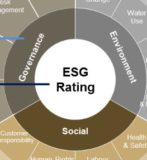Most international and domestic public (and many private) companies are being evaluated and rated on their environmental, social and governance (ESG) performance by various third party providers of reports and ratings. Institutional investors, asset managers, financial institutions and other stakeholders are increasingly relying on these reports and ratings to assess and measure company ESG performance over time and as compared to peers. This assessment and measurement often forms the basis of informal and shareholder proposal-related investor engagement with companies on ESG matters. Report and ratings methodology, scope and coverage, however, vary greatly among providers. Many providers encourage input and engagement with their subject companies to improve or sometimes correct data.
There are currently numerous ESG data providers, a summary of each of which is beyond the scope of this post, but some well-known third party ESG report and ratings providers include: (i) Bloomberg ESG Data Service; (ii) Corporate Knights Global 100; (iii) DowJones Sustainability Index (DJSI); (iv) Institutional Shareholder Services (ISS); (v) MSCI ESG Research; (vi) RepRisk; (vii) Sustainalytics Company ESG Reports; and (viii) Thomson Reuters ESG Research Data. This post provides an overview and analysis of these providers. [1]
This post also provides information on the ESG ETFs and portfolios offered by the following asset managers, which are based in part on these ESG reports and ratings: (i) BlackRock; (ii) The Vanguard Group; (iii) State Street Global Advisors (SSGA); (iv) BNY Mellon Investment Management; (v) PIMCO; (vi) Fidelity Investments; (vii) J.P. Morgan Asset Management; (viii) Wellington Management Group LLP and (ix) Prudential Financial.



